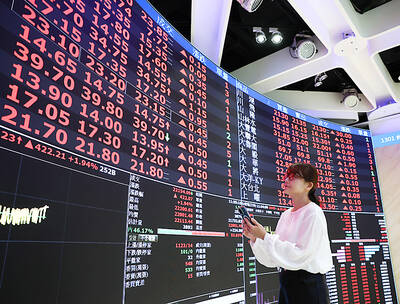Cable assembly maker Golden Bridge Electech Inc (金橋) yesterday said it aims to sustain revenue growth in the second half of this year, driven by rising demand for artificial intelligence (AI) applications in the consumer electronics sector.
The company would also seek to work with leading original equipment manufacturers and original design manufacturers to secure AI-related business opportunities, Golden Bridge Electech chief financial officer James Chiu (邱建明) said after its annual shareholders’ meeting in Taipei.
The company supplies high-fidelity signal cable assemblies as well as cables for electronics, electrical machines, communications, high-speed networks, computer peripherals, consumer electronics and medical equipment, its Web site says.

Photo: Screen grab from Golden Bridge Electech Inc’s Web site
Golden Bridge Electech is considering new investment and product development plans, as current equipment might not be sufficient for advanced production processes, such as those related to AI, Chiu said.
“It will take time and planning, as we need to assess whether the investment would generate revenue for the company, but we are moving in that direction,” he said.
Malaysia contributed the largest share of Golden Bridge Electech’s revenue last year at 24.55 percent, followed by China at 24.25 percent, the US at 21.89 percent, Taiwan at 15.32 percent and other regions combined at 13.99 percent, company data showed.
“We are planning product arrangements at our Malaysia plant, which has been operating for about two years,” Chiu said. “As the plant has also adopted automated production, we hope future operations could be smooth.”
The company is planning to shift some of its capacity in China to its facility in Sungai Petani, Malaysia, due to geopolitical uncertainties, he added.
Higher tariffs from US President Donald Trump’s administration have yet to cause a major effect on the company, as the costs are passed on to customers, Chiu said.
In the wake of a sharp appreciation in the New Taiwan dollar against the US dollar, the company has adopted natural hedging to lessen the effects, he said.
“When we had idle funds, especially in US dollars, we tended to sell them first, so while we did bear some foreign exchange losses, we took measures to cope with it,” he said, without revealing the amount of foreign exchange losses.
Shareholders yesterday approved the company’s proposal to distribute a cash dividend of NT$0.3 per share. That represented a payout ratio of 46.15 percent as the company posted earnings per share of NT$0.65 last year, after net profit surged 588.69 percent year-on-year to NT$76.32 million (US$2.6 million) and revenue grew 19.05 percent to NT$1.2 billion.

UNCERTAINTIES: Exports surged 34.1% and private investment grew 7.03% to outpace expectations in the first half, although US tariffs could stall momentum The Chung-Hua Institution for Economic Research (CIER, 中華經濟研究院) yesterday raised its GDP growth forecast to 3.05 percent this year on a robust first-half performance, but warned that US tariff threats and external uncertainty could stall momentum in the second half of the year. “The first half proved exceptionally strong, allowing room for optimism,” CIER president Lien Hsien-ming (連賢明) said. “But the growth momentum may slow moving forward due to US tariffs.” The tariff threat poses definite downside risks, although the scale of the impact remains unclear given the unpredictability of US President Donald Trump’s policies, Lien said. Despite the headwinds, Taiwan is likely

READY TO BUY: Shortly after Nvidia announced the approval, Chinese firms scrambled to order the H20 GPUs, which the company must send to the US government for approval Nvidia Corp chief executive officer Jensen Huang (黃仁勳) late on Monday said the technology giant has won approval from US President Donald Trump’s administration to sell its advanced H20 graphics processing units (GPUs) used to develop artificial intelligence (AI) to China. The news came in a company blog post late on Monday and Huang also spoke about the coup on China’s state-run China Global Television Network in remarks shown on X. “The US government has assured Nvidia that licenses will be granted, and Nvidia hopes to start deliveries soon,” the post said. “Today, I’m announcing that the US government has approved for us

When Lika Megreladze was a child, life in her native western Georgian region of Guria revolved around tea. Her mother worked for decades as a scientist at the Soviet Union’s Institute of Tea and Subtropical Crops in the village of Anaseuli, Georgia, perfecting cultivation methods for a Georgian tea industry that supplied the bulk of the vast communist state’s brews. “When I was a child, this was only my mum’s workplace. Only later I realized that it was something big,” she said. Now, the institute lies abandoned. Yellowed papers are strewn around its decaying corridors, and a statue of Soviet founder Vladimir Lenin

The National Stabilization Fund (NSF, 國安基金) is to continue supporting local shares, as uncertainties in international politics and the economy could affect Taiwanese industries’ global deployment and corporate profits, as well as affect stock movement and investor confidence, the Ministry of Finance said in a statement yesterday. The NT$500 billion (US$17.1 billion) fund would remain active in the stock market as the US’ tariff measures have not yet been fully finalized, which would drive international capital flows and global supply chain restructuring, the ministry said after the a meeting of the fund’s steering committee. Along with ongoing geopolitical risks and an unfavorable